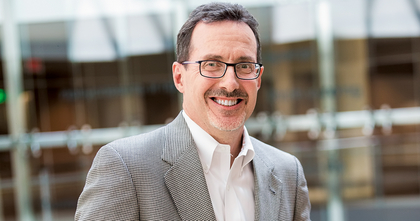
The International Experience: Mutual Need
Monday, January 29, 2018
The International Experience: A Network of Key Partners
The Carlson Global Institute (CGI) depends on key partnerships committed faculty, alumni willing to give back, and corporate friends—to support the international experience for students. And often, the experience has far reaching effects on them as well.
Cargill finds the University of Minnesota a natural ally.
“The University is similar to Cargill in that they both are broad institutions with rich perspectives. It touches our company in many, many places from engineering to business to ag and food science,” says Joe Ramaker, ’98 MBA and Vice President of Finance in Cargill’s starches, sweeteners, and texturizers business. “There’s a mutual need between the two.”
However, there is always opportunity to make this relationship stronger. “It’s probably the type of relationship you can take for granted because it’s in your backyard,” Ramaker says. “You don’t appreciate the full potential of what the full relationship could be.”
Ramaker wants to see more connections with the school, especially those that have an international bent. Site visits have been very popular this year. “We’ve been very involved in bringing classrooms to Cargill’s headquarters in Wayzata,” he says. “We had the Global Executive MBA program there in May. At the same time, an undergraduate business communications class visited our facility in Spain outside Barcelona.” In a few months Cargill will host an MBA Global Business Practicum with its animal protein business in China. “Through a variety of mechanisms, we are getting much more involved with the Carlson School,” he says.
The international interest is obvious. With 150,000 employees in 70 countries, Cargill is one of the top authorities on conducting business globally. “Global complexity is what we have to navigate every day,” he says. “One of our core strengths is understanding global food and agricultural supply chains. You need to be able to think across multiple regions, multiple countries, and multiple ways of doing business just to conduct the business we do every day.”
Cargill places a high value on international experiences. “We value it for people who are going to have leadership roles in the company,” Ramaker says. “We need people in leadership roles with an appreciation for how things work in different parts of the world. People who have an international experience are going to have a better understanding of diversity of thought and diversity of perspectives.”
Ramaker is in a good position to know, as he spent seven years himself as an expat in Brussels, Belgium with his wife (a ’97 MBA) and children. “The expat is given a broader way of thinking and is forced to learn how to be more appreciative of others, how they make decisions, and how they think through things culturally and in terms of business practices throughout the world,” he says.
Ramaker found his overseas experience so profound that he joined the CGI’s Advisory Board last year.
“I’m passionate for this. I believe in the international aspect,” he says. He’s particularly impressed with the international requirement for all students, something that didn’t exist when he was a student at the Carlson School. “I think I would have had a more rounded experience had I pursued that when I was there,” he says. “Students shouldn’t think that the international requirement is something they have to do, but rather something they need to do to make them a broader professional and a broader person.”
